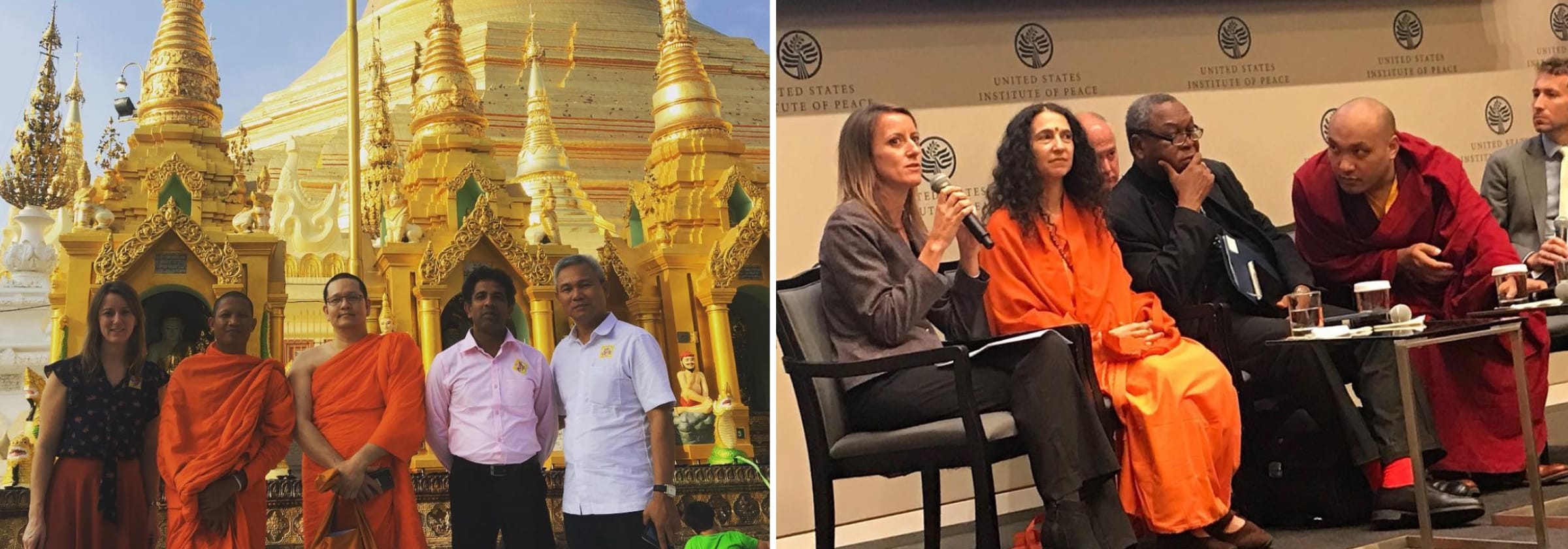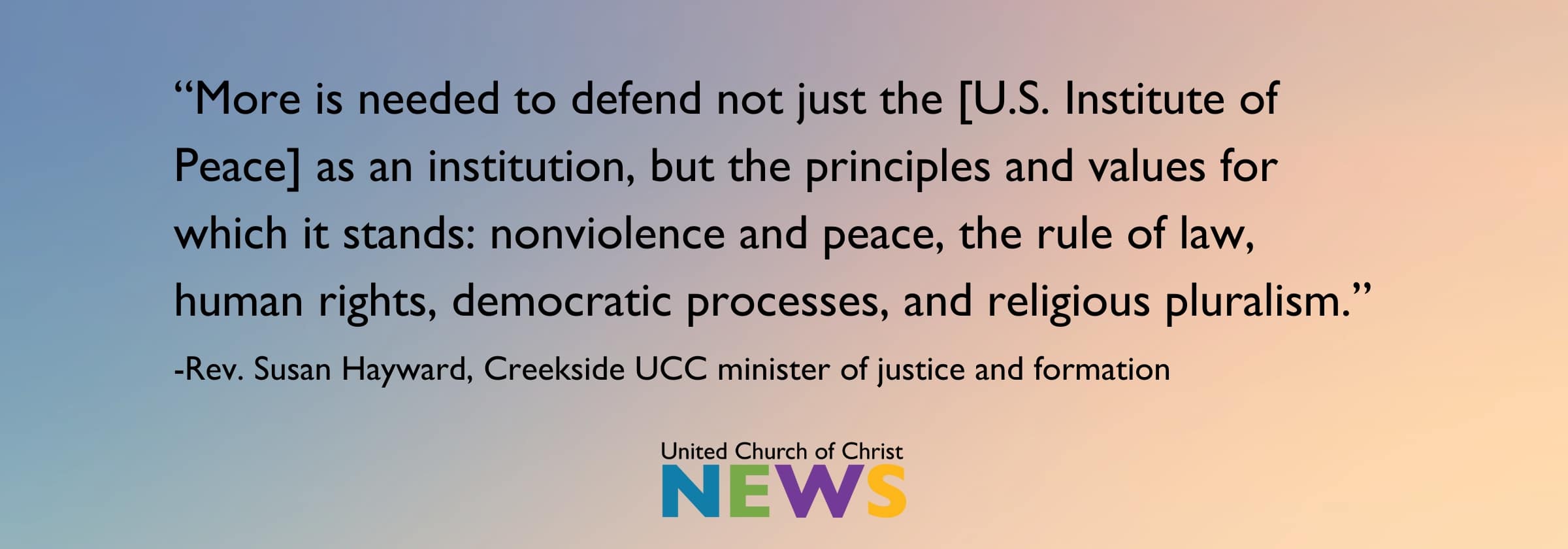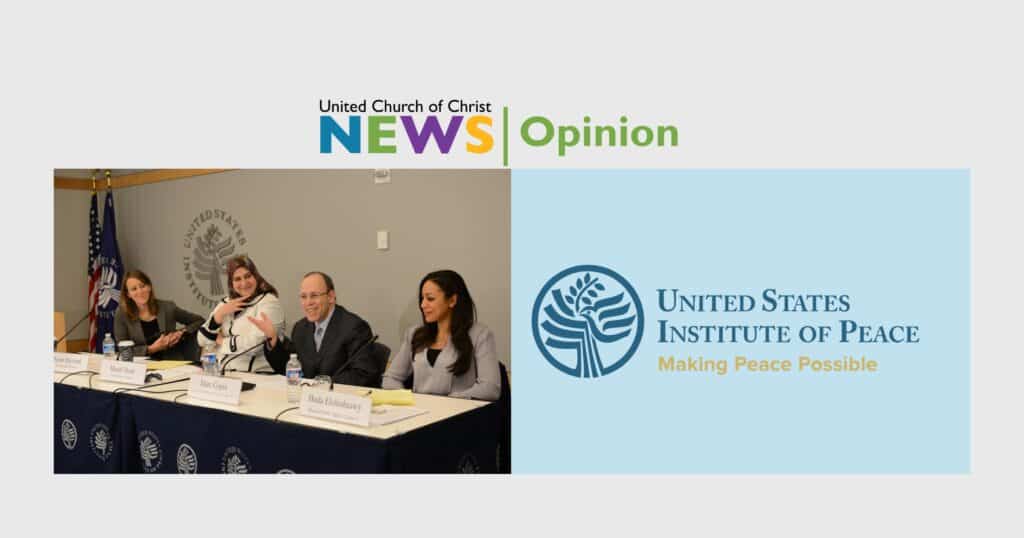Opinion: UCC pastor and former Institute of Peace Staffer calls for action in defense of peace
Editor’s Note: The United States Institute of Peace (USIP), an independent institute founded by Congress in 1984, was recently taken over by the Department of Government Efficiency, who fired most board members and staff, replaced the president, and transferred USIP building ownership to the federal government. USIP traces its origins back to the United Church of Christ and has had significant leadership from UCC ministers. As one response, the UCC Office of Public Policy and Advocacy has launched an action alert in support of humanitarian aid and peacebuilding.
“Coming within sight of Jerusalem, Jesus wept over it and said, “If only you had known the path to peace today! But now it has been hidden from your eyes.” – Luke 19:41-42
As a just peace denomination involved in the United States Institute of Peace’s creation, it’s time for those of us in the UCC to raise hell.
I remember when I first learned about the U.S. Institute of Peace. I’d recently graduated college and was living in Washington, D.C., working for the United Nations High Commissioner for Refugees. It was 2002, and the country was operating in the dark shadow cast by the 9/11 attacks. The administration of George W. Bush was preparing us for an invasion of Iraq.
USIP was holding events to address the complex social and political realities and generational conflicts in diverse Iraq society that the U.S. would inevitably confront following any toppling of the Ba’athist regime. Meanwhile, its religion program held a different kind of event entitled “Would a War in Iraq be a ‘Just War’?” that brought together experts in Christian just war theory to discuss long-held theological and moral criteria meant to prevent unnecessary wars. It was an event that stood out to me among the landscape of those in D.C. at the time. To the extent that religion was being discussed in post-9/11 DC, it was myopically discussed as a problem for peace and security – Islam in particular. But here was something different.

I signed up for USIP’s religion program events and attended them all, impressed with how under UCC Rev. Dr. David Smock’s leadership, the program approached religions in a nuanced manner. They recognized the capacity for religion to drive both just peace and violence in any given conflict context, and the vital role religious actors can and do play across all traditions in the midst of violent conflict to protect communities, pursue reconciliation, and transform drivers of conflict in pursuit of peace.
In time, I would come to work for this USIP program for 14 years, from 2007-2021, eventually leading it, ordained to the work of religious peacebuilding at USIP as a ministry of the United Church of Christ.
I worked with fearless Catholic sisters in Colombia who stood up to armed actors in defense of local communities, and with Buddhist monks and nuns in Myanmar who protected Muslims fleeing violent mobs. I supported efforts by Muslim leaders in Iraq to pursue reconciliation across sectarian divides, including through policy reform. And I worked to advance religious literacy within broader U.S. foreign policy, helping ensure the U.S. was acting in its pursuit of peace and human rights in a manner that respected religious diversity. It was hard and meaningful work.
Space to prevent and resolve violence
A week ago, the work of the USIP religion program, along with everything else at the Institute and its website, which housed its repository of resources to advance peacebuilding, were shuttered as a result of a takeover by DOGE, working at the direction of the Trump Administration. It was a violation of the rule-of-law, given USIP’s status as an independent entity and it was, in concert with the attack on USAID, an assault on any principled or even pragmatic American commitment to peacebuilding.
Congress created USIP in 1984 as the result of a long campaign to create a national peace academy dedicated to bolstering the U.S. ability to engage in nonviolent, nonmilitary means of preventing and resolving violence and conflict. Many faith communities advocated for USIP’s creation, including the United Church of Christ. When it was created, Congress established the Institute’s independence in order to ensure that its mission-commitment to peace would remain consistent through administration changes.
For over 40 years, the Institute has pursued that mission through peace education (helping seed many of the Peace and Justice Departments at universities across the country as well as providing trainings, classes, and resources in the U.S. and worldwide), direct engagement to support negotiations and mediations and other forms of peacebuilding worldwide, and by informing U.S. foreign policymakers. For 38 years, the Institute’s oldest thematic program, the Religion and Peacebuilding program, has helped develop the scholarship and practice of multi-religious peacebuilding, advanced religious freedom, combatted religious nationalism and supremacy, and advanced religious literacy in support of peace efforts.
It’s done this all with a modest budget from Congress, acting nimbly and consistently in some of the most violent places on earth.

In mid-March, the Trump Administration sacked the Senate-confirmed, bipartisan USIP Board of Directors and USIP’s acting president, Ambassador George Moose, and appointed its own person to lead the Institute. This went against the procedures outlined in the USIP Act passed by Congress. DOGE then broke into the building by threatening USIP’s former private security company and, with the assistance of the D.C. Metro police, forced Ambassador Moose and others still in USIP’s building out, vandalizing and occupying it. A federal judge denied a request for a temporary restraining order. On the night of March 28, virtually the entire remaining staff of USIP were fired. DOGE has transferred the USIP’s private building, valued at $500 million, to the Government Services Administration.
‘In defense of peace’
The lawsuit against DOGE initiated by members of USIP’s sacked Board continues. But more is needed to defend not just the Institute as an institution, but the principles and values for which it stands: nonviolence and peace, the rule of law, human rights, democratic processes, and religious pluralism.
I was ordained to the UCC for my work at USIP precisely because the work I was engaged in reflected our denomination’s values and commitments to pursue just peace and enact God’s love for all people, everywhere.
Our faith ancestors were involved in creating USIP, along with Congress, and it’s now up to us and Congress to step up in defense of what USIP represents, in a manner that USIP has lifted up and reflected over the past 40 years: through nonviolent direct action, drawing on the power of religious language and values across our diverse traditions, through organizing people from the bottom-up, top-down, and middle-out to effect transformation – all in the belief that peace is possible. And it’s right.
As Jesus approached Jerusalem in his final confrontation with violent power that would bring his death, he wept for it and how the ways of peace were hidden by and from its leaders.
In these dark days in which we are living now, when our political leaders are attacking, dismantling, and suppressing the ways that bring peace – seeking to hide them away from view – may we weep with Jesus, and then follow him into the fray in defense of peace.
Rev. Susan Hayward serves as minister of justice and formation at Creekside UCC in Minneapolis, Minnesota. From 2007-2021 she worked with the religion program at the U.S. Institute of Peace, and from 2020-2023 with the Religion and Public Life program at Harvard Divinity School.
Content on ucc.org is copyrighted by the National Setting of the United Church of Christ and may be only shared according to the guidelines outlined here.
Related News
A Moment of Silence
The weekend news was alarming. Two students shot and killed with 9 injured at Brown University...
Read MoreIn hope-filled worship service, UCC and United Church of Canada celebrate full communion past and future
On Saturday, Dec. 13, many from the United Church of Christ (UCC) and the United Church of...
Read More‘A Gift of God to the World:’ Christmas greetings from the General Minister and President
As Christmas quickly approaches, UCC General Minister and President/CEO the Rev. Karen Georgia...
Read More


